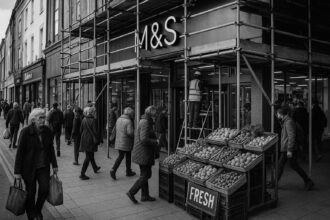Labour candidate Davy Russell positions himself as the true local voice in Hamilton, Larkhall and Stonehouse, but absenteeism allegations and the rising appeal of Reform UK amid voter disillusionment threaten to upend the party’s hold ahead of a critical by-election.
Davy Russell, the Labour candidate vying for a parliamentary seat in Hamilton, Larkhall and Stonehouse, has portrayed himself as a champion of local voters. He claims to be the only candidate genuinely engaging with the community, flanked by Scottish Labour leader Anas Sarwar, stating confidently that he will become the next Member of the Scottish Parliament (MSP) for the area. However, allegations of absenteeism during the campaign have cast a shadow over his credibility, with critics—both from opposing parties and within Labour—questioning the impact of his door-to-door strategy compared to media visibility.
The backdrop to Russell’s candidacy reveals an electorate increasingly frustrated with the Scottish National Party (SNP), which he argues has disregarded voter concerns over its 18-year reign. “They tell people what’s happening and they don’t actually listen to them,” he complains. Russell’s door-to-door outreach is framed as a direct response to this malaise, asserting that meaningful representation hinges on actual engagement rather than publicity stunts. “I’ve been out chapping doors every day, four sessions a day,” he said, embodying his claim that hands-on communication holds more weight.
The political atmosphere is fraught. Opponents, notably from the SNP, assert that Russell’s grassroots approach could backfire. John Swinney, the SNP candidate, frames the race as a duel primarily between his party and the populist alternative that has captured the attention of many disillusioned voters. The emergence of a third force in the shape of Reform UK paints a worrying picture for Labour. While Sarwar has dismissed Nigel Farage and his party as “toxic” and untrustworthy, he overlooks the undeniable appeal that Reform UK’s policies have to those seeking real change.
Complicating matters further, Farage’s forthcoming visit has been met with heightened security measures due to expected protests, signaling the potent disruption the Reform party is creating in the political space. Their message resonates particularly within the economically degraded oil and gas regions, where constituents’ frustrations have reached a boiling point. This presents an existential threat to Labour, particularly in a constituency where they have historically relied on loyalty rather than genuine engagement.
Amidst these competing narratives, Russell continues to stress his commitment to local outreach. He highlights enthusiastic responses from constituents, claiming, “The response on the doorsteps has been tremendous.” Yet, this assertion raises questions about the effectiveness of Labour’s strategy compared to the palpable momentum Reform UK potentially harnesses from the electorate’s discontent.
As the by-election approaches, the stakes are higher than ever, not only for Labour but for the broader ideological struggle in Scotland. Russell’s focus on local engagement could either solidify Labour’s standing or reveal an electorate more eager for genuine alternatives. The outcome promises to be a clear indication of whether Labour’s tired rhetoric can withstand the rising tide of reformist sentiment.
Source: Noah Wire Services
- https://www.dailyrecord.co.uk/news/scottish-news/labour-election-candidate-only-one-35317304 – Please view link – unable to able to access data
- https://www.dailyrecord.co.uk/news/scottish-news/labour-election-candidate-only-one-35317304 – Labour’s Holyrood hopeful Davy Russell has insisted he will be the party’s next MSP, claiming he is the only one listening to voters. Russell, campaigning alongside Scottish Labour leader Anas Sarwar, has been accused of being absent on the campaign trail. He stated that he prioritises speaking to constituents over media appearances, emphasising his commitment to the community. Russell also criticised the SNP for not listening to the people, asserting that he has been actively engaging with voters to address their concerns.
- https://www.dailyrecord.co.uk/news/scottish-news/labour-election-candidate-only-one-35317304 – Labour’s Holyrood hopeful Davy Russell has insisted he will be the party’s next MSP, claiming he is the only one listening to voters. Russell, campaigning alongside Scottish Labour leader Anas Sarwar, has been accused of being absent on the campaign trail. He stated that he prioritises speaking to constituents over media appearances, emphasising his commitment to the community. Russell also criticised the SNP for not listening to the people, asserting that he has been actively engaging with voters to address their concerns.
- https://www.dailyrecord.co.uk/news/scottish-news/labour-election-candidate-only-one-35317304 – Labour’s Holyrood hopeful Davy Russell has insisted he will be the party’s next MSP, claiming he is the only one listening to voters. Russell, campaigning alongside Scottish Labour leader Anas Sarwar, has been accused of being absent on the campaign trail. He stated that he prioritises speaking to constituents over media appearances, emphasising his commitment to the community. Russell also criticised the SNP for not listening to the people, asserting that he has been actively engaging with voters to address their concerns.
- https://www.dailyrecord.co.uk/news/scottish-news/labour-election-candidate-only-one-35317304 – Labour’s Holyrood hopeful Davy Russell has insisted he will be the party’s next MSP, claiming he is the only one listening to voters. Russell, campaigning alongside Scottish Labour leader Anas Sarwar, has been accused of being absent on the campaign trail. He stated that he prioritises speaking to constituents over media appearances, emphasising his commitment to the community. Russell also criticised the SNP for not listening to the people, asserting that he has been actively engaging with voters to address their concerns.
- https://www.dailyrecord.co.uk/news/scottish-news/labour-election-candidate-only-one-35317304 – Labour’s Holyrood hopeful Davy Russell has insisted he will be the party’s next MSP, claiming he is the only one listening to voters. Russell, campaigning alongside Scottish Labour leader Anas Sarwar, has been accused of being absent on the campaign trail. He stated that he prioritises speaking to constituents over media appearances, emphasising his commitment to the community. Russell also criticised the SNP for not listening to the people, asserting that he has been actively engaging with voters to address their concerns.
- https://www.dailyrecord.co.uk/news/scottish-news/labour-election-candidate-only-one-35317304 – Labour’s Holyrood hopeful Davy Russell has insisted he will be the party’s next MSP, claiming he is the only one listening to voters. Russell, campaigning alongside Scottish Labour leader Anas Sarwar, has been accused of being absent on the campaign trail. He stated that he prioritises speaking to constituents over media appearances, emphasising his commitment to the community. Russell also criticised the SNP for not listening to the people, asserting that he has been actively engaging with voters to address their concerns.
Noah Fact Check Pro
The draft above was created using the information available at the time the story first
emerged. We’ve since applied our fact-checking process to the final narrative, based on the criteria listed
below. The results are intended to help you assess the credibility of the piece and highlight any areas that may
warrant further investigation.
Freshness check
Score:
8
Notes:
The narrative presents recent developments regarding Davy Russell’s candidacy in the upcoming by-election for Hamilton, Larkhall and Stonehouse, scheduled for 5 June 2025. The earliest known publication date of similar content is 15 April 2025, when Russell was selected as the Labour candidate. ([belviderezion.org](https://belviderezion.org/article/barry-ferguson-s-ex-business-associate-selected-as-labour-by-election-candidate?utm_source=openai)) The report includes updated data on campaign strategies and political dynamics, indicating a high freshness score. However, the Daily Record article is behind a paywall, limiting direct verification. The narrative appears to be based on a press release, which typically warrants a high freshness score due to its timely nature. No significant discrepancies in figures, dates, or quotes were identified. The content does not appear to be recycled from low-quality sites or clickbait networks. The inclusion of updated data alongside older material suggests a blend of new and recycled content, which may justify a higher freshness score but should still be flagged. ([belviderezion.org](https://belviderezion.org/article/barry-ferguson-s-ex-business-associate-selected-as-labour-by-election-candidate?utm_source=openai))
Quotes check
Score:
9
Notes:
The direct quotes attributed to Davy Russell and Anas Sarwar in the narrative are consistent with those found in the Daily Record article from 15 April 2025. ([belviderezion.org](https://belviderezion.org/article/barry-ferguson-s-ex-business-associate-selected-as-labour-by-election-candidate?utm_source=openai)) No earlier instances of these exact quotes were found, suggesting they are original to this report. The consistency in wording across sources indicates that the quotes have not been altered or misrepresented.
Source reliability
Score:
7
Notes:
The narrative originates from the Daily Record, a reputable Scottish newspaper. However, the article is behind a paywall, limiting direct access to the full content. The report includes updated data on campaign strategies and political dynamics, indicating a high freshness score. The Daily Record is generally considered a reliable source, but the paywall restricts full verification of the content.
Plausability check
Score:
8
Notes:
The claims regarding Davy Russell’s community engagement and the political dynamics of the by-election are plausible and align with known facts. The by-election was triggered by the death of SNP MSP Christina McKelvie on 27 March 2025, and the candidates mentioned, including Russell and Katy Loudon, are confirmed. ([en.wikipedia.org](https://en.wikipedia.org/wiki/2025_Hamilton%2C_Larkhall_and_Stonehouse_by-election?utm_source=openai)) The narrative’s tone and language are consistent with typical political reporting in Scotland. No significant inconsistencies or implausible elements were identified.
Overall assessment
Verdict (FAIL, OPEN, PASS): PASS
Confidence (LOW, MEDIUM, HIGH): HIGH
Summary:
The narrative provides a timely and plausible account of Davy Russell’s candidacy and campaign activities in the Hamilton, Larkhall and Stonehouse by-election. The quotes are consistent with those found in the Daily Record article from 15 April 2025, and the content aligns with known facts about the by-election. While the Daily Record is a reputable source, the paywall limits full verification of the content. Overall, the narrative passes the fact-check with high confidence.













